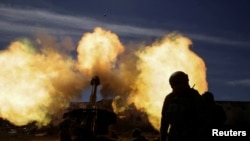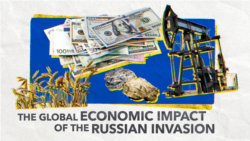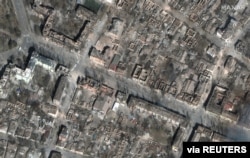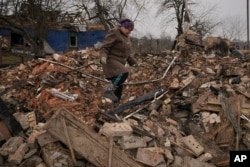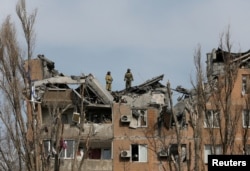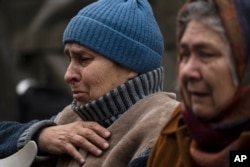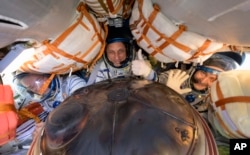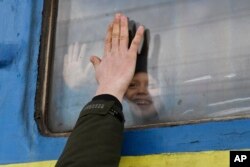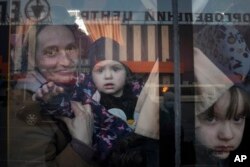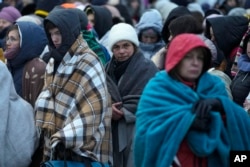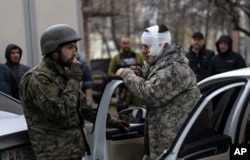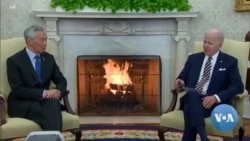For full coverage of the crisis in Ukraine, visit Flashpoint Ukraine.
Recap of March 30
FIGHTING
* A U.S. official said Russian President Vladimir Putin has been misled by advisers too scared to tell him how poorly the war in Ukraine is going and how damaging Western sanctions have been.
* The Russian military has continued shelling areas around Kyiv and the northern city of Chernihiv, despite a Russian promise at peace talks Tuesday to reduce military activities in those areas.
HUMANITARIAN
* The International Committee of the Red Cross confirmed Wednesday that its building, with a Red Cross symbol on the roof, in Mariupol came under fire.
* The U.N. refugee agency said Wednesday that more than 4 million Ukrainians are refugees, while another 6.5 million are displaced inside the country and 13 million are stranded in war-affected areas.
DIPLOMACY
* The Kremlin downplayed talk of progress in peace talks with Kyiv to end Moscow's attack on Ukraine, saying there was nothing "too promising" in discussions in Istanbul.
* Russian Foreign Minister Sergey Lavrov arrived in China as Russia attempts to shore up support from its most powerful ally.
SANCTIONS
* Poland is taking steps to end Russian oil imports by the end of this year.
* Germany is triggering the early warning level for gas supplies amid Russia’s continued demand to be paid in rubles.
NUCLEAR CONCERNS
* International Atomic Energy Agency head Rafael Mariano Grossi said his agency is planning to send experts to nuclear facilities and provide additional vital safety and security supplies.
* Ukraine reported that there is a danger of ammunition exploding at the Chernobyl nuclear power station and that Russian forces occupying the plant must pull out of the area.
For the latest developments of the conflict between Russia and Ukraine, all times EDT:
10:37 p.m.: The BBC reports that the value of the Russian ruble has returned to prewar levels. It had plunged after multiple nations enacted sanctions against Russia.
8:52 p.m.: Ukraine President Volodymyr Zelenskyy has recalled the country’s ambassadors to Georgia and Morocco, suggesting they hadn’t done enough to persuade those countries to support Ukraine and punish Russia for the invasion, The Associated Press reported.
“With all due respect, if there won’t be weapons, won’t be sanctions, won’t be restrictions for Russian business, then please look for other work,” Zelenskyy said in his nighttime video address to the nation Wednesday, AP reported. “I am waiting for concrete results in the coming days from the work of our representatives in Latin America, the Middle East, Southeast Asia and Africa.”
He added “the diplomatic front is one of the key fronts” in Ukraine’s battle to win the war against Russia.
6:30 p.m.: Ukrainian forces have liberated the Russian-occupied village of Kukhari in the Vyshhorod district of the Kyiv region. But Russian forces have continue to bombard the village with artillery and aircraft. RFE/RL correspondent Levko Stek was on the ground during one of the attacks.
5:30 p.m.: Andriy, 15, and his mother, a cousin and friends were trying to leave Chernihiv, a town north of Kyiv under heavy Russian shelling, after their house was destroyed. His mother and two others died as their car hit a mine planted by Russian forces. Andriy survived with serious injuries and told his story to Radio Free Europe/Radio Liberty at the hospital in the western city of Lviv where he is recovering.
4:15 p.m.: Russian soprano Anna Netrebko said Wednesday that she plans to resume performing in late May after announcing in the early days of war in Ukraine that she was taking a “step back” from the stage. In a statement, Netrebko also repeated her opposition to the war and said she was not “allied with any leader of Russia.” The 50-year-old opera singer said at the beginning of March that she was “opposed to this senseless war of aggression” and called on Russia to end it, according to the Associated Press.
3:45 p.m.: Pentagon press secretary John Kirby briefed the media Wednesday regarding latest developments in the war in Ukraine. VOA’s National Security Correspondent Jeff Seldin followed his remarks and shared them on Twitter.
3:11 p.m.: As the U.N. agency mandated to coordinate and lead on global education, UNESCO is carefully mapping how host countries are supporting education efforts to help Ukrainian refugee children, the U.N. said in a statement Wednesday. “Beyond learning, education offers a protective environment that is even more relevant to crisis-affected populations, particularly children,” according to the U.N. Educational, Scientific and Cultural Organization (UNESCO).
3:02 p.m.: Since the Russian invasion of Ukraine on February 24, Russian authorities have moved to wipe out any dissenting voices, any effort at civil disobedience, and any public criticism not just of the war, but also of the military and the government's conduct. Still, some Russians are resisting, and showing opposition to the conflict. OVD-Info, a Russian NGO that has tracked police arrests for years, has tallied dozens of incidents. Current Time, a co-production of Radio Free Europe/Radio Liberty and VOA, takes a look at some of them.
2:35 p.m.: Slovakia has told Russia it must cut 35 staff members at its embassy in Bratislava because of the actions of another Russian diplomat. "In this context, we regret that, following the previous expulsions of Russian diplomats in the last two years, the Russian diplomatic mission has not shown any interest in operating correctly on our territory," it added. Slovakia did not give details on the activities it found unacceptable, nor did it give a time frame for when the cuts must be made, according to Radio Free Europe/Radio Liberty.
2:21 p.m.: Speaker of the House Nancy Pelosi on Wednesday hosted Ukraine’s ambassador and a delegation of women members of Ukraine’s parliament for a meeting at the U.S. Capitol.
2:16 p.m.: As millions of Ukrainians flee their homes and many are caught in the crossfire of an unprovoked war, there has been an outpouring of support from people around the world. One Ukrainian woman in Guatemala has mobilized the online community to help Ukrainians. For VOA News, Eugenia Sagastume has the story.
1:47 p.m.: Russian hackers have recently attempted to penetrate the networks of NATO and the militaries of some eastern European countries, Google's Threat Analysis Group said in a report published on Wednesday. The report did not say which militaries had been targeted in what Google described as "credential phishing campaigns" launched by a Russian-based group called Coldriver, or Callisto. NATO was not immediately available for comment on the report, according to Reuters.
1:36 p.m.: The U.N. World Health Organization director expressed his outrage Wednesday, saying that since Russia invaded Ukraine, there have been 82 attacks on health care facilities, resulting in at least 72 deaths and 43 injuries.
1:22 p.m.: When European Commission President Ursula von der Leyen and Charles Michel, president of the European Council, meet for a virtual summit with Chinese President Xi Jinping on April 1, they plan to warn Beijing that there will be consequences if it provides aid to Russia amid its invasion of Ukraine. The high-stakes summit comes as ties between China and the European Union are more delicate than ever, Radio Free Europe/Radio Liberty reports.
1:13 p.m.: Russia may have committed war crimes by killing civilians and destroying hospitals in its pounding of Ukrainian cities, the top United Nations human rights official said on Wednesday in her strongest comments yet on the conflict. Addressing the U.N. Human Rights Council in Geneva, Michelle Bachelet urged Russia to end its five-week invasion. "Homes and administrative buildings, hospitals and schools, water stations and electricity systems have not been spared," she said in a statement. "Indiscriminate attacks are prohibited under international humanitarian law and may amount to war crimes," she added.
1:05 p.m.: Russia’s military invasion of Ukraine has not only created one of the world’s most tragic humanitarian crises but resulted in economic devastation that will reverberate far beyond Ukraine’s borders. VOA News Graphics team has this report.
12:49 p.m.: The International Committee of the Red Cross confirmed Wednesday that its building in the besieged city of Mariupol came under fire, even though its roof is marked with a Red Cross symbol.
“Under international humanitarian law, objects used for humanitarian relief operations must be respected and protected at all times,” ICRC said in a statement. It said the facility hasn’t been used since March 15 and it doesn’t know if some others might have been using the space. “We do not have a team on the ground there, so have no other information on potential casualties or the extent of the damage,” the ICRC said.
12:42 p.m.: Ukraine’s Minister of Foreign Affairs Dmytro Kuleba said Wednesday that Russia has not ceased its hostilities and called he for more arms and sanctions to strengthen Ukraine’s position during ongoing negotiations aimed at ending the war.
12:35 p.m.: Russia's defense ministry said on Wednesday its forces were regrouping to focus on other key areas and complete the "liberation" of the breakaway eastern Donbas region, Reuters reported. The ministry's statement, part of a reframing of Moscow's stated objectives in recent days, came a day after Russia said it would scale back operations near Kyiv and Chernihiv to support progress in peace talks. However, Russian attacks in both Kyiv and Chernihiv continued on Wednesday, according to local officials.
12:29 p.m.: Russia’s state TV has pulled out all the stops to sell the Kremlin’s narrative on the war in Ukraine, Radio Free Europe/Radio Liberty reports. "All of television is now full of military brainwashing," Yelena Rykovtseva, an RFE/RL Russian Service correspondent who focuses on the media, wrote recently in a column headlined “Carpet Bombing Of The Brain.” She added that, in a single article, it is hard to do justice to the content on Russian state TV at the “peak of anti-Ukrainian hysteria.”
12:01 p.m.: U.S. President Joe Biden spoke with Ukraine’s President Volodymyr Zelenskyy Wednesday about “the ongoing work by the United States and its allies and partners to deliver military, economic, and humanitarian assistance to Ukraine and to impose severe costs on Russia,” according to a statement from the White House. Biden also told Zelenskyy that the U.S. will provide $500 million in direct budgetary aid to Ukraine’s government. Zelenskyy briefed Biden on the status of Ukraine’s peace talks with Russia, the statement added.
11:49 a.m.: VOA’s National Security Correspondent Jeff Seldin Wednesday confirmed with a U.S. official that newly declassified information shows a breakdown in trust between Russia’s President Vladimir Putin and his top advisers.
“We have information that Putin felt misled by the Russian military. There is now persistent tension between Putin and the MOD (Ministry of Defense), stemming from Putin’s mistrust in MOD leadership,” the U.S. official said. “Putin didn’t even know his military was using and losing conscripts in Ukraine, showing a clear breakdown in the flow of accurate information to the Russian President,” he said.
“We believe that Putin is being misinformed by his advisors about how badly the Russian military is performing and how the Russian economy is being crippled by sanctions, because his senior advisors are too afraid to tell him the truth,” the U.S. official added.
10:53 a.m.: Hungary’s foreign minister on Wednesday accused Ukraine’s leadership of attempting to interfere in the upcoming Hungarian election, The Associated Press reported. In a video on social media, Hungarian Foreign Minister Peter Szijjarto claimed that there was “ongoing coordination between the Hungarian left and representatives of the Ukrainian government,” and that Ukraine was attempting to influence Hungary’s April 3 election in favor of a coalition of opposition parties. He offered no evidence supporting the claim, and his Ukrainian counterpart denied the charge.
10:42 a.m.: The invasion of Ukraine thrust its president, Volodymyr Zelenskyy, into the spotlight. Although many perceived the former actor and comedian as a probable lightweight, he rose to the occasion, capturing the world’s attention when he famously refused a U.S. offer to evacuate the conflict zone, reportedly saying, “The fight is here. I need ammunition, not a ride.” VOA’s Dora Mekouar asks, is Zelenskyy making democracy cool again?
10:37 a.m.: Ukraine accused Russia on Wednesday of planting mines in the Black Sea and said some of those munitions had to be defused off Turkey and Romania as risks to vital merchant shipping in the region grow, Reuters reported. The Black Sea is a major shipping route for grain, oil and oil products. Its waters are shared by Bulgaria, Romania, Georgia and Turkey as well as Ukraine and Russia. Ukraine's foreign ministry said Russia was using naval mines as "uncontrolled drifting ammunition" Russian officials did not immediately respond to requests for comment.
10:29 a.m.: Russian forces are shelling nearly all cities along the frontline separating Ukrainian government-controlled territory from areas held by Russian-backed separatists in the eastern Donetsk region, the regional Donetsk governor said on Wednesday. Pavlo Kyrylenko said on national television the situation could worsen as Russian forces concentrated their efforts to attack the Donetsk region, according to Reuters.
10:20 a.m.: German Chancellor Olaf Scholz has told Ukrainian President Volodymyr Zelenskyy that Germany is ready to act as security guarantor for Ukraine, said a German government spokesperson in Berlin. Scholz signaled a "general willingness" about the role in a phone call with Zelenskyy, spokesperson Steffen Hebestreit told a regular news conference on Wednesday. Hebestreit said he did not want to speculate about whether the security guarantor role would also include a military component, Reuters reported. Scholz made his comments a day after Russia and Ukraine held negotiations in Istanbul, Turkey, aimed at ending the conflict in Ukraine.
10:18 a.m.: Ukrainian negotiator Mykhailo Podolyak, speaking a day after Russian and Ukrainian delegations met in Turkey for peace talks, said that Russian forces must withdraw to their positions before the February 24 invasion to pave the way for any peace deal to be put to a national referendum, The Associated Press reported. Podolyak said in an online briefing Wednesday that a deal on multilateral security guarantees for Ukraine will be a key part of the package to be discussed. Meanwhile, the head of Russia’s delegation, Vladimir Medinsky, said that Ukraine’s readiness to consider a neutral status would meet a key Russian demand. Medinsky said that during Tuesday’s talks in Istanbul, Ukraine submitted a set of proposals including its readiness to adopt a non-bloc, nuclear-free status and drop its bid to join NATO, adding that this signaled Ukraine’s readiness to reach agreement “for the first time in years.”
10:12 a.m.: The Director General of the International Atomic Energy Agency, Rafael Mariano Grossi, is in Ukraine and said Wednesday his agency is planning to send experts to nuclear facilities and provide additional vital safety and security supplies. International concern has grown over fighting near some of Ukraine’s nuclear facilities.
10:07 a.m.: State-sponsored hacking by Russia presents a threat to American national security, a top FBI official told lawmakers this week. Bryan Vorndran, an assistant director in the FBI's cyberdivision, told a U.S. House of Representatives committee hearing Tuesday that the threat from Russia was “very, very real -- and current” in both a criminal sense and in the nation-state sense. Vorndran told lawmakers that instances of Russian hackers "scanning" networks in the U.S. energy sector have increased recently, and he said such activity represents a "reconnaissance phase" by Russia to try and understand a company's defenses and vulnerabilities. Radio Free Europe/Radio Liberty has the story.
9:42 a.m.: Russians living abroad find that their money is “toxic” according to a Reuters report published Wednesday. Interviews with nine Russians living overseas - as well as their wealth managers, lawyers, tax advisers, real estate and art brokers - suggest that Western sanctions meant to punish Putin's inner circle are also broadly ensnaring Russian passport holders. Four Russians living overseas with dual citizenship described banks freezing their accounts or payments in London, Zurich and Paris. One wealthy émigré in London said he had switched to cash to make purchases and was keeping a low profile.
9:35 a.m.: A Ukrainian official says Russian forces occupying the defunct Chernobyl nuclear power station must pull out of the area after Ukraine's armed forces warned there is a danger of ammunition exploding at the site. "We demand that the UN Security Council immediately take measures to demilitarize the Chernobyl exclusion zone and introduce a special UN mission there to eliminate the risk of the repeat of a nuclear catastrophe," Ukrainian Deputy Prime Minister Iryna Vereshchuk said in a video on the Telegram social media platform on Wednesday. Radio Free Europe/Radio Liberty has the story.
9:28 a.m.: An estimated 200-300 civilians were killed in the Ukrainian town of Irpin near Kyiv before the town was taken back from Russian forces this week, the local mayor said on Wednesday. Mayor Oleksandr Markushyn told a briefing that about 50 Ukrainian servicemen had been killed in Irpin, and some bodies were still trapped under rubble. He said there had been Russian shelling in the area all night, Reuters reported.
9:15 a.m.: Russia and Ukraine agreed to open three civilian evacuation corridors, Ukrainian Deputy Prime Minister Iryna Vereshchuk announced Wednesday. Vereshchuk said one corridor would be used for the evacuation of the besieged city of Mariupol and delivery of humanitarian aid to Berdyansk, located about 84 kilometers south of Mariupol, another for the delivery of humanitarian aid to – and evacuation from – the city of Melitopol, and a third for a column of people traveling from from Enerhodar to Zaporizhzhia, VOA News reported.
9:12 a.m.: U.S. Undersecretary of State for Political Affairs Victoria Nuland, commenting after the start of peace talks between Russia and Ukraine in Turkey this week, said Russia's negotiating position with Ukraine in Istanbul has been: "Capitulate and then maybe we'll talk." Ukraine, meanwhile, is willing to talk about neutrality and long-term leasing in Crimea, among other concessions, she added. Even as Russia repositions its forces around Kyiv, Nuland said, the invading army has been "absolutely unwilling to have a full cease-fire so that negotiations can get serious." She spoke with Current Time, a co-production of Radio Free Europe/Radio Liberty and VOA.
8:44 a.m.: A NASA astronaut caught a Russian ride back to Earth on Wednesday after a U.S. record 355 days at the International Space Station, returning with two cosmonauts, The Associated Press reported.
Mark Vande Hei landed in a Soyuz capsule in Kazakhstan alongside the Russian Space Agency’s Pyotr Dubrov, who also spent the past year in space, and Anton Shkaplerov.
8:35 a.m.: A survey by the International Rescue Committee of almost 500 Ukrainian refugees in Poland found that 90 percent do not have enough cash to meet their needs beyond one month, the IRC said in a statement Wednesday, noting that it is scaling up cash assistance to families displaced in Poland. “Providing cash to families allows them to purchase what they need directly from functioning markets, not only giving them the right to choose what they and their families need most, but also supporting local economies and markets,” IRC said.
8:00 a.m.: Out of the now over 4 million reported Ukrainian refugees, 2 million who fled are children and another 2.5 million are displaced within Ukraine according to UNICEF. “The situation inside Ukraine is spiraling,” said UNICEF Executive Director Catherine Russell in a statement. She also noted that her agency continues to scale up its response efforts.
7:54 a.m.: The U.N. refugee agency said Wednesday that now over 4 million Ukrainians are refugees, while another 6.5 million are displaced inside the country and 13 million are stranded in war-affected areas. The U.N. High Commissioner for Refugees Filippo Grandi arrived in Ukraine Wednesday and traveled to the western city of Lviv. “I will discuss with the authorities, the UN and other partners ways to increase our support to people affected and displaced by this senseless war,” he said on Twitter.
7:36 a.m.: The Kremlin on Wednesday downplayed talk of progress in peace talks with Ukraine to end Moscow's attack on its neighbor, saying there was nothing "too promising" in the results of a round of discussions in Istanbul. Kremlin spokesman Dmitry Peskov told reporters in Moscow a day after the talks held Tuesday, while it was encouraging that Kyiv had started to outline its positions more concretely, "we cannot state that there was anything too promising or any breakthroughs." He added, "There is a lot of work to be done.” Radio Free Europe/Radio Liberty has the story.
7:23 a.m.: In the strongest signal yet that Russia could be preparing an even tougher response to the West's sanctions, Russia's top lawmaker suggested on Wednesday that almost all of Russia's energy and commodity exports could soon be priced in rubles, Reuters reported. Asked about the comments by parliament speaker Vyacheslav Volodin, Kremlin spokesman Dmitry Peskov said: "This is an idea that should definitely be worked on." Peskov said that the U.S. dollar's role as a global reserve currency had already taken a hit, and that a move to pricing Russia's biggest exports in rubles would be "in our interests and the interests of our partners."
7:15 a.m.: Ukrainian civilians who have escaped from the besieged port city of Mariupol have described scenes of “hell” and say those who remain in the ruins are on the brink of starvation. Russian forces have surrounded the city and have been pounding it with artillery and rocket fire. Some civilians have been allowed to flee during breaks in the shelling, and some of them spoke to Current Time, a co-production of Radio Free Europe/Radio Liberty and VOA.
6:51 a.m.: The British government said on Wednesday it had issued 25,500 visas to Ukrainians under schemes set up to bring in refugees after Russia invaded Ukraine last month, Reuters reported. Data from the Home Office showed that 22,800 visas had been given under the Ukraine family scheme that allows applicants to join family members in the UK, while 2,700 were offered under the sponsorship scheme which permits refugees with a named sponsor to enter. The data on Wednesday also showed that 28,300 had applied for the sponsorship scheme, while the overall applications stood at 59,500. With the number of people fleeing from the war currently running at over 4 million, the British government has been under pressure to do more to take in refugees.
6:49 a.m.: Ukraine’s President Volodymyr Zelenskyy on Wednesday called for worldwide participation in the upcoming global pledging event “Stand Up For Ukraine” which aims to raise funds for Ukrainian citizens affected by the war. The online humanitarian pledging summit on April 9 is being hosted by the President of the European Union Commission Ursula von der Leyen and Canada’s Prime Minister Justin Trudeau in partnership with the activist organization Global Citizen.
6:32 a.m.: Senior Ukrainian officials say that the Russian military has continued shelling areas around the Ukrainian capital Kyiv and the northern city of Chernihiv, according to The Associated Press. Oleksandr Pavliuk, the head of the Kyiv region military administration, said Wednesday that there were 30 Russian shellings of the residential areas and civilian infrastructure in the Bucha, Brovary, and Vyshhorod regions around the capital. The barrage came despite a Russian pledge to reduce military activities around Kyiv and Chernihiv after talks between Russian and Ukrainian negotiators in Turkey on Tuesday. Olexander Lomako, the secretary of Chernihiv city council, said in a voice message to the AP that military action increased in intensity overnight and “the city was bombed, shelled by artillery and heavy weapons,” with a library and a shopping mall among places that were hit.
6:25 a.m.: The United Nations on Wednesday named three human rights experts to conduct an investigation into possible war crimes and other violations committed during the conflict in Ukraine, Reuters reported.
The independent panel has a mandate to “investigate all alleged violations and abuses of human rights and violations of international humanitarian law and related crimes in the context of the aggression against Ukraine by the Russian Federation,” a statement said.
The U.N. Human Rights Council agreed on March 4 to establish the commission of inquiry, for one year, at the request of Ukraine and allies including the European Union, Britain and United States.
5:10 a.m.: A spokesman for the World Food Program said the agency welcomes talk of a possible pullback of Russian forces in parts of Ukraine but the process of negotiating aid access has not improved. Tomson Phiri told The Associated Press on Wednesday that “we expect faster clearances, faster guarantees of access.” He said WFP has already reached 1 million people with assistance. The goal is to reach 4 million in the coming months.
On Tuesday, David Beasley, the head of the WFP, told the U.N. Security Council that the month-old war has turned Ukraine “from the breadbasket of the world to breadlines.” He told the Security Council that 50% of the grain it purchases to feed 125 million people around the globe comes from Ukraine, and warned that it will have to start cutting rations in war-torn areas like Yemen, which has already had its food allotment cut in half due to rising costs of food, fuel and shipping. Beasley said Ukraine and Russia combined produce 30% of the world’s wheat supply, 20% of its corn and between 75-90% of sunflower seed oil. Egypt and Lebanon alone receive just over 80% of its grain supplies from Ukraine. VOA has this story.
4:30 a.m.: Poland’s Prime Minister Mateusz Morawiecki said Wednesday that his country is taking steps to end Russian oil imports by the end of this year, the Associated Press reported. Poland has already largely reduced its dependence on Russian oil. On Tuesday, the country announced it was banning imports of Russian coal. Morawiecki said he expects gas imports will be cut in May and called on other European countries to follow suit.
4:00 a.m.: A free and prosperous Indo-Pacific is more important than ever, President Joe Biden said while meeting with his Singaporean counterpart against the backdrop of a raging conflict in Ukraine, which Biden has painted as a global struggle between liberal democracy and autocracy. Singapore's leader said this is a battle for a rules-based global order. VOA’s Anita Powell reports from the White House.
3:30 a.m.: Ukraine’s Deputy Prime Minister Iryna Vereshchuk said on Wednesday the country’s armed forces reports that there is a danger of ammunition exploding at the Chernobyl nuclear power station and that Russian forces occupying the plant must pull out of the area, Reuters reported.
“We demand that the U.N. Security Council immediately take measures to demilitarize the Chernobyl exclusion zone and introduce a special U.N. mission there to eliminate the risk of the repeat of a nuclear catastrophe,” she said.
3:15 a.m.: Germany’s economy minister said he is triggering the early warning level for gas supplies amid Russia’s continued demand to be paid in rubles, the AP reported. Robert Habeck told reporters Wednesday that this was the first of three warning levels and entails the establishment of a crisis team in his ministry that will heighten monitoring of the gas supply situation. Habeck said he took the measure after Moscow indicated it would require payment in rubles despite the Group of Seven countries rejecting such demands on Monday. He says Germany’s gas storages are currently filled to about 25% capacity.
2:50 a.m.: Ukraine’s Deputy Prime Minister Iryna Vereshchuk announced Tuesday that the country hopes to open three humanitarian corridors to evacuate civilians from besieged towns and cities, Reuters reported. She said this would include trying to establish a safe corridor for people to leave the encircled southern port city of Mariupol in private vehicles. The corridors are expected to be set up on Wednesday.
2:00 a.m.: The U.K. defense ministry said Wednesday that Russian unites have been forced to return to Belarus after suffering heavy losses in order to reorganize and resupply. The report further notes that as ground forces are pushed back, Russia “will likely continue to compensate for its reduced ground manoeuvre capability through mass artillery and missile strikes.”
1:30 a.m.: Russian Foreign Minister Sergey Lavrov arrived in China as Russia attempts to shore up support from its most powerful ally.
Lavrov landed in Huangshan, an eastern city on Tuesday. He is scheduled to attend meetings on the topic of stabilizing Afghanistan with representatives from Pakistan, Iran, Tajikistan, Turkmenistan and Uzbekistan. A separate meeting of the “extended troika” will include representatives of the United States, China and Russia, Al Jazeera reported. The meetings will take place in the town of Tunxi, which is isolated from major population centers.
The trip marks Lavrov’s first to China since Russia’s invasion of Ukraine. Prior to the visit Lavrov declared Russia-China relations were at their strongest ever, Reuters reported.
12:30 a.m.: Negotiations are expected to resume Wednesday, five weeks into what has devolved into a bloody war of attrition, with thousands dead and almost 4 million Ukrainians fleeing the country, The Associated Press reported.
Earlier, Ukrainian President Volodymyr Zelenskyy expressed skepticism Tuesday night about Russia’s announcement that it would significantly scale back military operations near Ukraine’s capital and a northern city.
“Yes, we can call those signals that we hear at the negotiations positive. But those signals don’t silence the explosions of Russian shells,” Zelenskyy said. “Of course, we see the risks. Of course, we don’t see any basis for trusting the words voiced by those or other representatives of the state that is continuing to fight for our destruction. “Ukrainians are not naïve people,” Zelenskyy said. “Ukrainians have already learned during the 34 days of the invasion and during the past eight years of war in the Donbas that you can trust only concrete results.”
12:00 a.m.: Opponents of Russia’s invasion of Ukraine gathered in the U.S. state of Colorado to raise funds for displaced civilians and to remember those killed by Nazis during World War II. From Denver, Svitlana Prystynska has our story.
Some information in this report came from The Associated Press and Reuters




